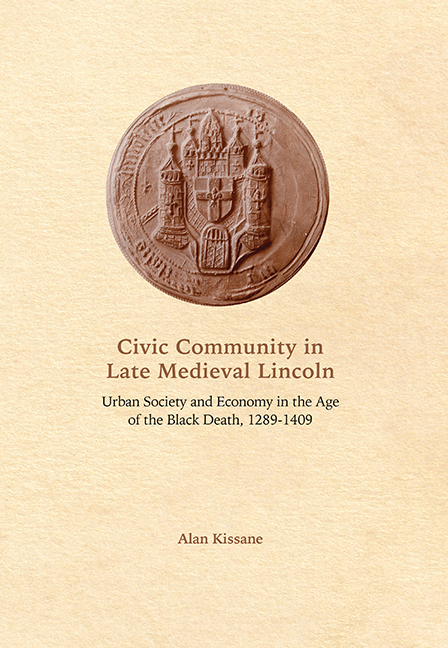 Civic Community in Late Medieval Lincoln
Civic Community in Late Medieval Lincoln Book contents
- Frontmatter
- Contents
- List of Illustrations
- Acknowledgements
- Abbreviations and Note on the Text
- Introduction
- 1 Urban Foundations: Occupational Structure
- 2 Lincoln as Entrepôt: Tolls, Trade and Credit
- 3 The Crown and the Fee Farm
- 4 The Growth of Civic Government
- 5 Fraternity, Orthodoxy and Communal Cooperation
- 6 Chantry Founders, Commemoration and the Rental Market
- Conclusion
- 1 Appendix 1: Occupational Sources and Data
- 2 Appendix 2: Lincoln Civic Officials, 1289-1409
- 3 Appendix 3: Lincoln Members of Parliament, c.1290-1410
- 4 Appendix 4: The Fraternal Year
- 5 Appendix 5: Perpetual Chantry Foundations
- Bibliography
- Index
3 - The Crown and the Fee Farm
Published online by Cambridge University Press: 27 April 2017
- Frontmatter
- Contents
- List of Illustrations
- Acknowledgements
- Abbreviations and Note on the Text
- Introduction
- 1 Urban Foundations: Occupational Structure
- 2 Lincoln as Entrepôt: Tolls, Trade and Credit
- 3 The Crown and the Fee Farm
- 4 The Growth of Civic Government
- 5 Fraternity, Orthodoxy and Communal Cooperation
- 6 Chantry Founders, Commemoration and the Rental Market
- Conclusion
- 1 Appendix 1: Occupational Sources and Data
- 2 Appendix 2: Lincoln Civic Officials, 1289-1409
- 3 Appendix 3: Lincoln Members of Parliament, c.1290-1410
- 4 Appendix 4: The Fraternal Year
- 5 Appendix 5: Perpetual Chantry Foundations
- Bibliography
- Index
Summary
The concept of ‘urban decline’ in the later Middle Ages, and in particular during the period between 1420 and 1560, has been debated at length by historians, although the extent to which it has been deemed characteristic of all towns is, as of yet, far from settled. Whilst some towns seemingly thrived, including Salisbury and Exeter, for example, others, like Boston and Lincoln, purportedly declined. Unsurprisingly, broad generalisations over the relative success or failure of all English towns remain problematic and, as Palliser notes, ‘there was much variation at a short-term level’, meaning that it becomes necessary to consider the longer-term fortunes of towns if any accurate conclusions are to be drawn. For example, whilst Coventry and Colchester are typically characterised as flourishing in the years immediately following the Black Death, both undoubtedly underwent decline in the latter stages of the fifteenth century; thus at what dates should any analysis of these particular towns, or indeed any town, begin and end? As Alan Dyer asks, ‘Should losses be absolute, or relative to other towns or the countryside?’
An equally pressing problem is that of evidence. Whilst previous studies have drawn upon four main types of statistical records in discussions of urban decline, namely freemen admissions, customs records, rent values and taxation assessments, alongside other non-statistical data, including petitions for fiscal relief, the alleged ‘flight from office’ by civic officials and archaeological evidence, more recent studies have begun to consider an even broader corpus of evidence, including networks of credit and urban occupational structures, both of which have been used to identify aspects of urban decline and vigour. Therefore the evidence by which towns are said to grow or contract is extremely varied and, in many cases, not comparable, given the limited survival of many civic records.
Of this evidence, however, the most controversial still remains the frequent ‘complaints of poverty made by burgesses attempting to obtain fee farm relief ’, otherwise an annual tax paid to the crown by civic governments in return for the right of self-governance. As evidence dictates, such complaints were made most vociferously in the period between c.1430 and c.1480 when the crown remitted approximately £13,000 in relief for this payment, with towns including Oxford, Cambridge and Chester successfully claiming aid, though they were by no means the only ones.
- Type
- Chapter
- Information
- Civic Community in Late Medieval LincolnUrban Society and Economy in the Age of the Black Death, 1289-1409, pp. 93 - 123Publisher: Boydell & BrewerPrint publication year: 2017


